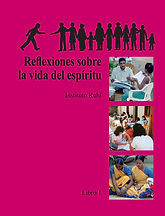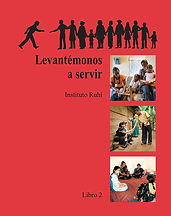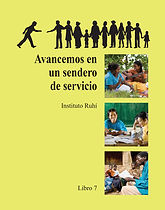

Study Circles

Purpose
Open to all, study circles bring together friends ages 15 and older to advance through a sequence of courses developed by the Ruhi Institute inspiried by the Bahá’í Writings. Through this process, participants walk together on a ‘path of service,’ developing the capacity to carry out visits to neighbors and facilitate children’s classes and junior youth groups. These acts of service assist in building communities inspired by spiritual principles such as unity in diversity, universal education, the equality of women and men, and the elimination of all prejudice.

“The light of a good character surpasseth the light of the sun and the radiance thereof.”
Bahá'í Writings
At the Chelsea Bahá'í Institute, training takes place through study circles—a space where a tutor, a more experienced friend supports and accompanies a group of youth and adults as they study the materials and put into practice acts of service that gradually increase in complexity.
Like a path we walk together, acts of service begin simply—organizing a devotional gathering or visiting a friend to share meaningful conversations—and gradually grow in complexity, such as offering children’s classes, animating junior youth groups, or serving as a tutor for a study circle.
Below you’ll find a brief description of a few of the first seven courses in the main sequence. To join a study circle in your area, please contact us.
Some of the courses offered by the Bahá'í Institute:
1
Book 1: Reflections on the Life of the Spirit
Learn about the transformative power of the Word of God, prayer, and the life of the soul, and begin to engage in uplifting conversations with friends and neighbors.

2
Book 2: Arising to Serve
Learn to engage in conversations on meaningful spiritual and social themes—such as the importance of education, the equality of women and men, and many others—while studying and beginning to connect with friends and neighbors.

3
Book 3: Teaching Children’s Classes
Develop the qualities and skills needed to serve as a children’s class teacher, learning how to nurture spiritual virtues in young children with both love and discipline.

5
Book 5: Releasing the Powers of Junior Youth
Learn the concepts, skills, qualities, and attitudes that experience has shown to be essential for those who wish to serve as animators of junior youth groups, while reflecting on the importance of the period of youth.

Book 7: Walking Together on a Path of Service
Learn how to accompany participants through the first six courses of the sequence. Participants explore the spiritual dynamics of advancing on a path of service and examine the concepts, attitudes, and skills needed to accompany a group of friends along this journey.

7
The Period of Youth
“The period of youth is characterized by strength and vigor and stands out as the choicest time in human life.”
Bahá'í Writings
The period of youth is a dynamic stage of life—a time to make lasting contributions to one's community.
During this period, young people are full of energy, idealism, and a desire to help improve the world, regardless of their social circumstances. They learn to look at the environments in which they interact with others—families, friends, schools, workplaces, media, and communities—and to recognize the social forces at play. Love of truth, thirst for knowledge, and an attraction to beauty inspire them to serve those around them. Yet other forces, such as materialism and selfishness, can distract them and hold back both individual and collective growth.
When life is not approached as a coherent whole, it can lead to anxiety and confusion. Through selfless acts of service, however, young people learn to cultivate a life in which its many aspects complement one another. In this way, they discover how to balance the spiritual and material dimensions of existence and develop a strong sense of purpose.
Youth are called to stand at the forefront of community building work. By becoming teachers of children’s classes and animators of junior youth groups, they contribute to the spiritual education of new generations while strengthening their own capacities for service. In this way, they walk a path of service that advances both their own spiritual growth and the collective progress of society.
